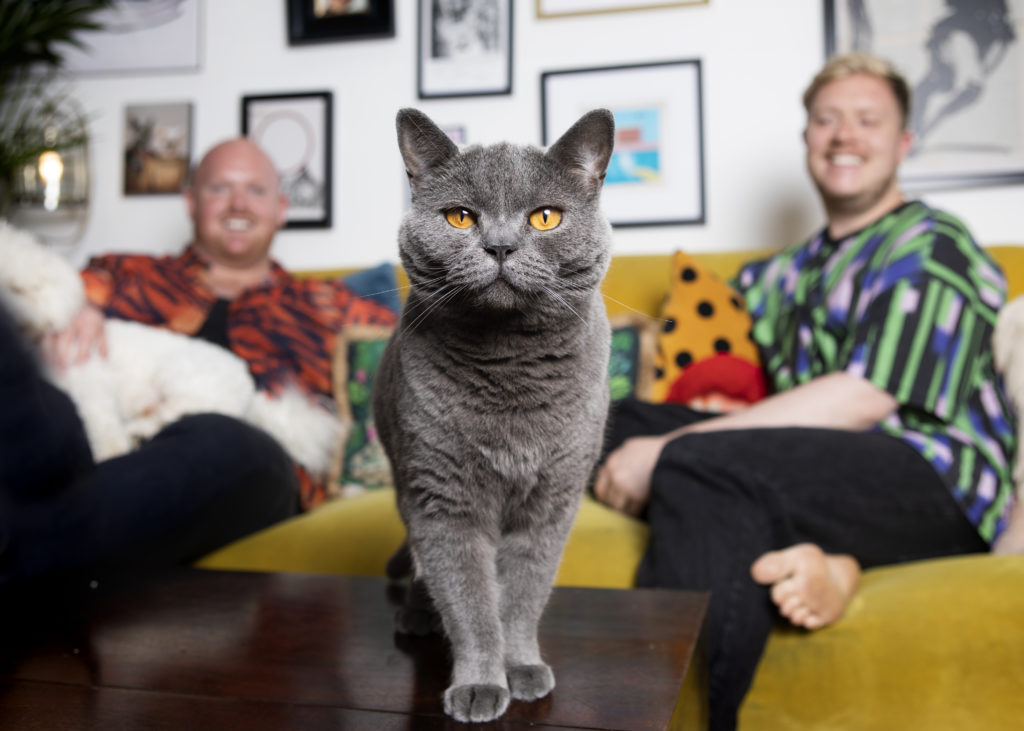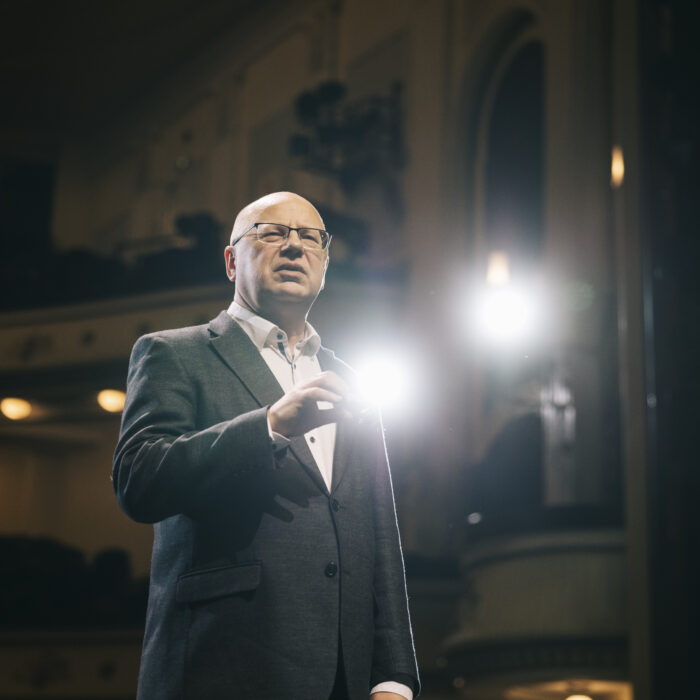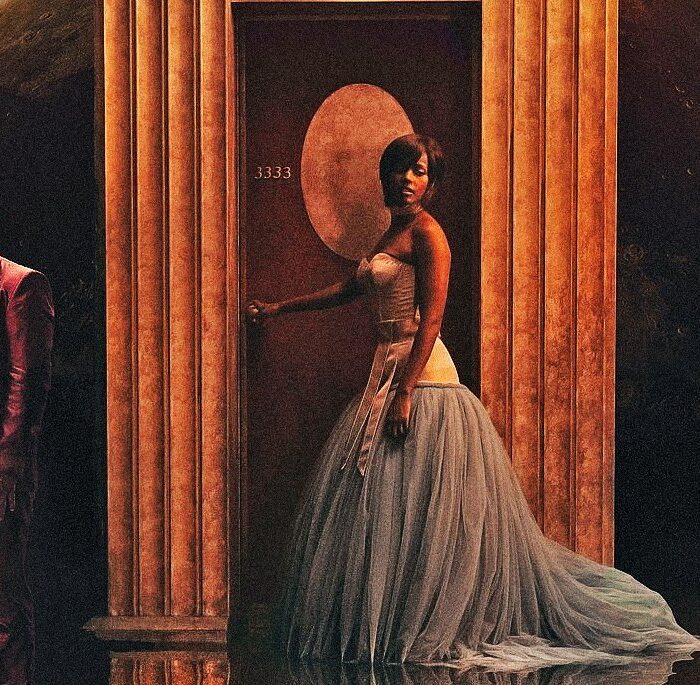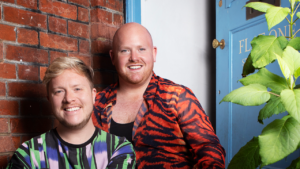
At Home With – Tenor Nicky Spence & Pianist Dylan Perez in the UK
By Chris RuelPhotos: Frances Marshall
“At Home With… ” is a collaboration between OperaWire and photographer Frances Marshall of Marshall Light Studio, combining original photography with insightful interviews that reveal the human side of those we see on stage.
Star Scottish tenor Nicky Spence and his fiancé, accompanist Dylan Perez, have a big day ahead of them. The two will marry on January 1, 2022. During a fun, rapid-fire round of word association using operatic themes, I threw out the word love. Spence responded with “wedding,” and Perez, “us.” It was a very human moment, honest and intimate.
During our time together on a Zoom call, every so often one of the two would excuse themselves to take care of the potatoes on the stove. Dinner time was approaching in the UK. In keeping with the name of this series, I felt as if I was at home with them, having a pre-dinner chat before sitting down at the table.
But before we got onto the topic of love, we talked about the beginning of the pandemic and what it was like when the world came to a halt over 20 months ago. Spence was rehearsing a production of “Rusalka,” and Perez was working in the London conservatoires.
“When we knew they shut the theaters,” Spence said, “there was a kind of feeling of relaxation. We never stop, and so I saw it as a lovely sort of mini-break.”
Perez, after initially feeling freaked out, eventually found a groove. ‘I didn’t know what I was going to do inside for two weeks. Then it turned into months and months. After a while, I enjoyed it, but at the very beginning, I had no idea what was going on.’
The couple settled in, worked on wedding plans, watched Netflix, and welcomed a new addition to the family: a dog named Glen—a “vortex of need,” according to Spence.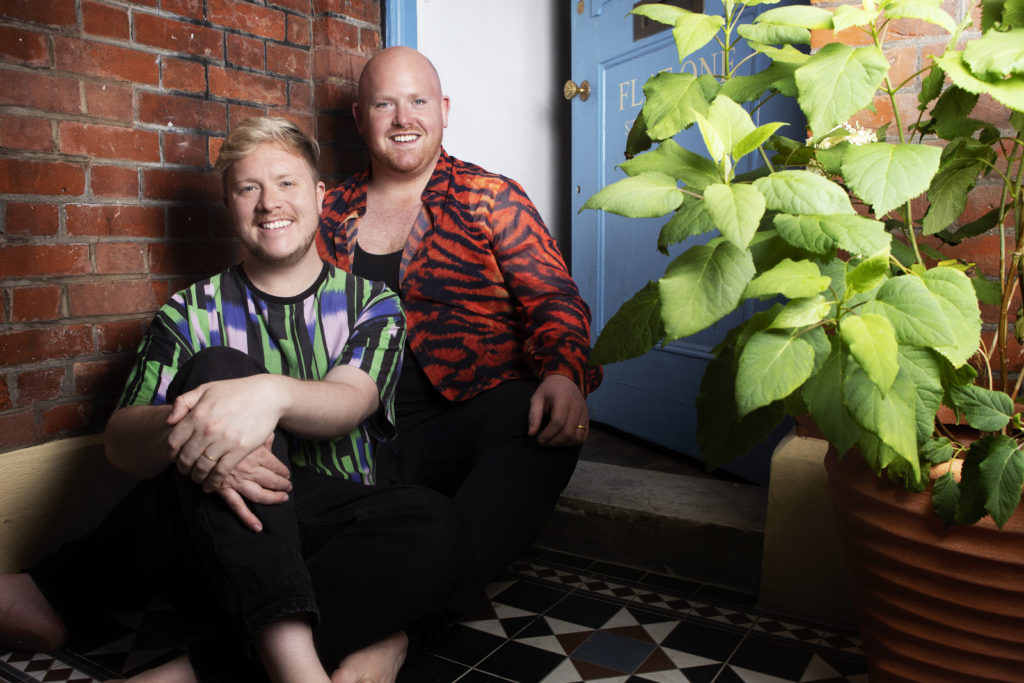
A Vocalist and Accompanist Locked Down Under the Same Roof
Such a combination of talent seems ideal for both to practice when in-person sessions were non-existent, and it was, according to both.
“We monopolized on the fact that we could rehearse things, but we tend not to abuse each other musically,’ Spence related. ‘Generally, we’ve got lovely respect for our musical relationship.”
A bit of a respite and spending time together was a high point, but there were moments when the two had to rely on each other for support when low.
“When I had four operas canceled, Dylan and I sat down to work out how we could survive making no money at all. That was hard.” Spence said.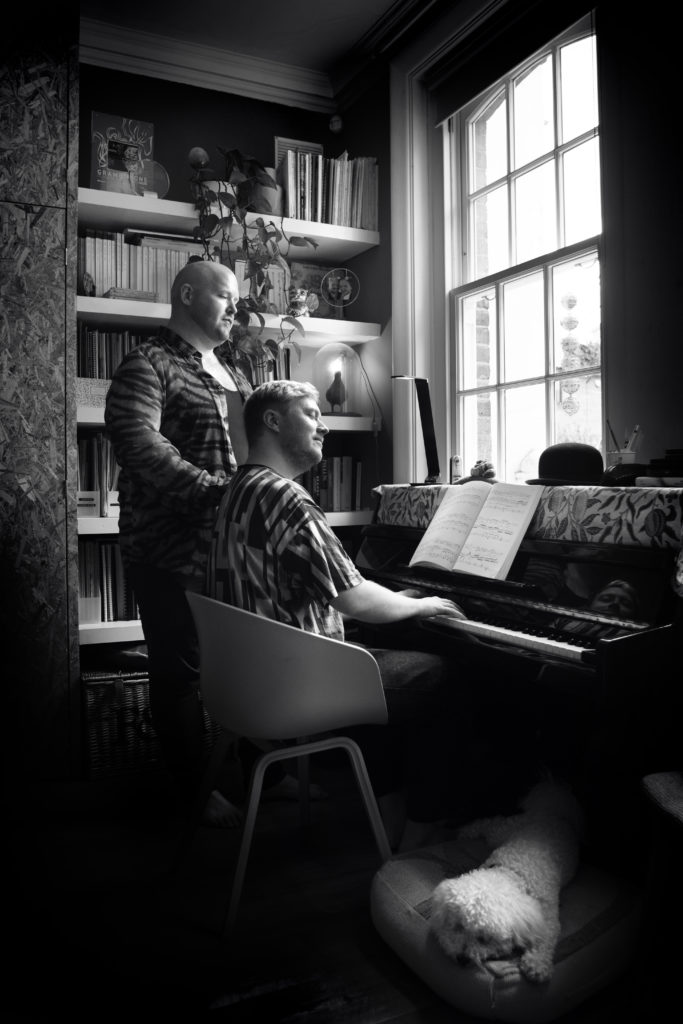
For Perez, there was an added wrinkle; he’s not a UK citizen, and, therefore, wasn’t eligible for government help.
“I think the low point was the finances of it. I remember thinking, Oh, God, this can’t go on forever.”
Spence added, “We were much luckier than some people. We had some reserves, and we had some ingenuity to work it out. I went into hustle mode. I thought; if this is what it’s going to be like, what are we going to do? How are we going to keep going?”
A Commitment to Assisting Fellow Artists Financially
For the past 20 years, Spence has served as an ambassador for Help Musicians, UK, a charity that provides financial assistance to artists across the musical spectrum. The organization helped fund him when he was at the Guildhall School of Music as a post-grad.
“When I was growing up, I literally did not have a bean. I lived on a farm in Scotland, and we used to hold events just so I could buy a suit. I wanted to give back.
“I’ve always done big fundraising missions; I’ve cycled from Glasgow to London, which is not fun. I’ve done some talks about mental health, and Help Musicians UK asked me to be an ambassador for them.
“They have been incredible during the pandemic in terms of mental health provision and in terms of actual, practical money: just helping people pay their bills, keeping people in their houses, and helping people survive. I’m very happy to be associated with that.’
I found Spence’s mention of mental health pertinent. The opera life, with its demands, can take a toll on artists, and the necessity of mental hygiene is easy to forget. Throw in anxiety about re-entering the world of live performance while the pandemic continues, and taking care of oneself becomes even more essential.
Said Spence, “It’s such a demanding career. It’s a very fruitful career but demanding as well and I think keeping an eye on your mental health and how you can check in with yourself to make sure that you don’t give your whole self to your job is important.
“I’ve seen it so many times, when people hide all their hopes and dreams on being something which they think is what they should be after completing so many years of training. Then, they realize they haven’t had a life, and they haven’t nurtured children, or relationships, or anything. That’s why I’m a big advocate, and Dylan is always an amazing rock for me in terms of that.
“[There’s this idea] that to be a successful person, you need to turn off health, family, relationships. I think that’s bulls—, and I think it’s really important that we advocate for a more human industry. I had to beg to get a day off so we can get married when we moved our wedding day. It shouldn’t be that difficult to prioritize your mental health and your personal life.”
When things are in full swing for Spence, he might be away for five, six, maybe even 10 or 11 months. But he and Perez have a rule, according to Spence. He and Perez never spend over two weeks apart, even if the visit is just for two days.
Perez noted Spence heads off to Berlin just 48 hours after they marry. “That will be the first time we’ve been apart in two years. It will be very strange.”
Re-entry and Masks
As the venues open up (and close back down because of climbing rates of infection), I asked both about re-entry and what that’s been like.
“I think it’s been a bit rough. Suddenly, people want the arts, but they want it the same way that they had it before the pandemic,” Perez said. “Meanwhile, we have had 20 months of performing behind screens, not performing in front of people. I think I’ve had a lot more stage anxiety than I did before, just because it feels new again and a bit off-putting. But I think audiences expect a high level, as if there wasn’t a pandemic. It’s nice to remind ourselves that we are all human and we all need a bit of time to get used to performing again.”
The performances I’ve attended in New York have mandatory mask requirements, and I’ve wondered how artists feel when looking at a sea of masks.
Perez stated he was glad to see masks being worn, but he added it was a bit concerning just seeing people’s eyes. “You do feel a bit like; is anybody there?”
On the flip side, Spence spoke of singing in a mask, and how it recently caused issues.
“Singing in a mask has just been horrendous. I lost my voice recently when I was doing a run at Covent Garden, and I was so stressed because I hadn’t worked properly for a year and then I lose my bloody voice because I’m wearing a mask. It’s just horrendous luck.”
Advice for those Growing in Their Career
One of my favorite questions to ask established artists is what knowledge they would pass along to young artists, particularly during such an unpredictable time.
Perez’s advice? “Don’t rush it. I must tell myself that every day. We look at each other, and we gauge our success on what we see everybody else doing on social media. Someone will say, I’m doing a recital here, here, and here, and I’ll think, oh God, I’m a failure because I’m not doing those recitals. But then I think, no, it’ll happen eventually. I think I just have to remember to play the long game, don’t burn out, and take it one day at a time.”
Spence nodded in agreement and gave a “huh.” It seemed he just learned something new about his partner, and I found it heartwarming.
“When I was much younger,” Spence said, “I used to look sideways as well, and I found that I have my best successes when I realized what made me special instead of thinking about what it was other people were looking for. I wasn’t trying to be anybody else but myself.
“I think young artists these days are very good with all the social media things but not necessarily good at the real core of their craft, which is being able to sing and being prepared for when these possible big breaks happen. I think if they arm themselves with skills and self-awareness about what it is, their USPs—their unique selling points—then they will be much more equipped for careers, when they hopefully happen.”
